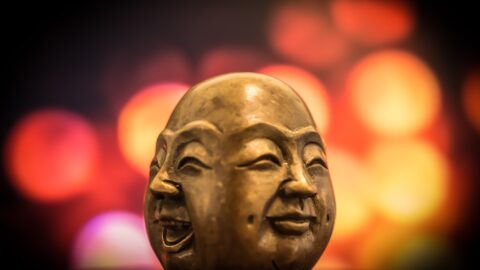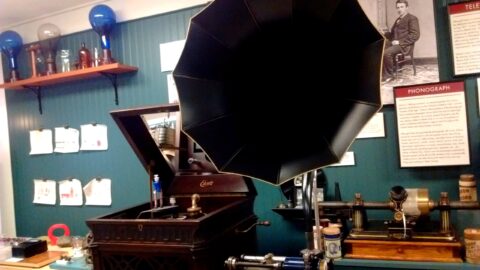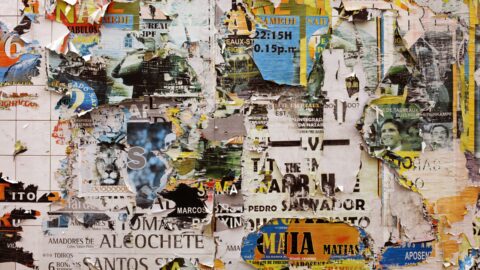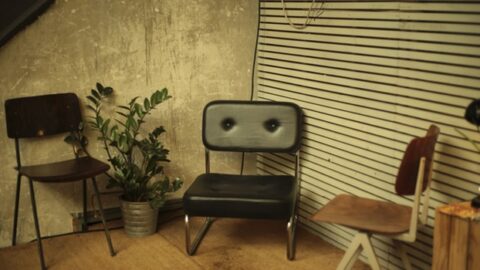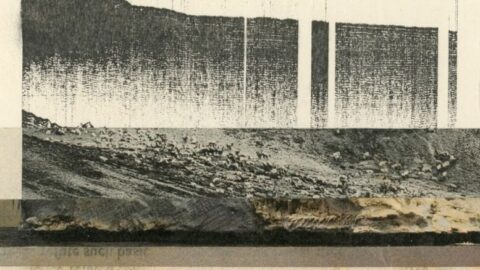Can you recall that weighted-release in high school or college when you finally submitted your close-reading of an esteemed author’s work? Remember that one author whose words lingered in the recesses of your mind long after your class invested countless hours in discussion?
Eddie Izzard, Still Dressed to Kill
Being a Writer Makes Me a Bad Buddhist
I have been bad at Buddhism since I was introduced to the teachings of the Buddha at 17 years old. I’ve been making the same mistakes, relearning and then forgetting the same lessons, while the decades pass. Which, I suppose, proves some of the most basic teachings of the Buddha after all.
Turning 25, Meditation and Productivity
Lately I’ve been meditating. Not on anything in particular, when I can help it, but rather practicing the art of meditation.
Meet the Wizard: Thomas Edison’s Long Shadow in Menlo Park, NJ
I am standing inside a one-room museum on Christie Street, in what is now Edison, NJ (formerly Menlo Park), looking out at the first road in the world to be lit by electric lights. Thomas Edison lived here during a flurry of invention, production and patenting from 1876-1882. Today, the structures of the workshop and the Edison residential home, as well as those first incandescent bulb lamps, are gone.
This estate was only briefly inhabited by the iconic genius, but boasts the sites of some of his most famous discoveries. Come here to visit the spot where a bamboo filament made the first incandescent bulb shine and the desk where Edison tinkered with Alexander Graham Bell’s telephone enough for it to work better, more consistently.
This is a museum dedicated to those six early yet heady years in the career of Thomas Edison, with a heavy emphasis on his start as a child impresario.
Carnage Garden: A Conversation with Samantha Parker Salazar
Samantha Parker Salazar’s paper installations take on a life of their own, a life where light, shadow, color and form vibrate with movement. Her pieces can sprawl across entire walls and ceilings or envelop an entire room.
Within these dancing forms, a story unfolds: Informed by the life and experiences of her ancestor, Cynthia Ann Parker, Salazar explores and exposes a story that has been forgotten over time.
You can see Salazar’s work in Vol. 8 of Newfound Journal here.
The Art of Massage Therapy
As many students begin their school year, tomorrow I will finish with mine.
Through an unlikely series of events, I was able to earn my licensure for massage therapy in the state of New Jersey through my county college.
While I am grateful to be able to enter this field, I am excited to be finished with school. I am excited for an end to anatomy and physiology classes at 8 a.m. I am excited for the end of tests.
I really hate 8 a.m.
The Death of a Book
Tiny wisps of paper drifted in the wind, the miniscule inked letters oblivious of their fate. Like so many leaves falling in autumn, the snippets of prose gathered in the only way shredded paper could: haphazardly. The source of this textual confetti lie upon the wooden bench, sunlight glinting off the now-torn cover.
I saw this through horrified eyes. Nearly dropping my glass of still-cool Kool-Aid, I rushed over to the book’s carcass, grasping desperately at the ripped pages in a futile attempt to keep all parts intact. Tears flooded my eyes.
My mother’s dog stood nearby, panting, eyes upon me. A small piece of book cover was caught in the fur of her chin.
How to Find New Books To Read and Give Back to the Literary Community
When was the last time you visited your local library?
August is About Bodies
We are now beyond the polite sundress season, way past hiding bra straps and donning breezy cardigans. In almost any weather, I prefer layered clothing. Just as socks protect me from blisters, keeping my thighs and arms under wrap prevents chafing and other discomforts. When you hike and garden and wander as much as I do, you get used to swaddling a body.
Until August. Ninety degrees and 100% humidity is my breaking point for modesty. I wake up every morning itching mosquito bites along my ankles and calves. I am acutely aware of what a damp, needy, sensitive body I have, all the livelong month. It’s too hot to feel shame or do anything but seek shelter and cling to relief (as calamine lotion or aloe gel or a tower fan or a glass of ice water).
August is about surrender. August is about bodies.
I Don’t Like Change
Comedians and Kids Books: The Problem with Jumping on the Bandwagon
I should start off by saying that perhaps it is more of a British occurrence than North American, but the wave of comedians finding newfound fame and success by writing children’s books is still going strong, regardless of how far it has spread.
It began a few years ago when comedy writer and performer David Walliams, known for his lewd sketch shows and bawdy characters, wrote a number of best-selling children’s books.
Home: A Photo Essay
Of course “home” means many things, and perhaps most importantly, it means people.
It is also made up of objects. Artifacts. Things inside a home are there to make life work, as well as to remind us who we are and where we’ve been. I like going home. After being away, the stuff there evokes memories. If I’m home too long I take these things for granted. I can’t see them anymore. This is a photo essay to help me see again.
Literary Budget: How Should You Spend Your Writing Time?
Writers never have enough time. Even those who aren’t yet writers—the ones who claim they have a book in them, somewhere—don’t have the time to write their novels! Sure, everyone’s heard of NaNoWriMo, but have you actually tried to marathon-write a book in that time? And—here’s the key part—not wanted to throw your laptop or writing pad out the window?
Writing is Hard!
We’ve all, at some point in our writing careers, tried to put that effort into our work to really be satisfied with what we’re contributing to our list of accomplishments.
Notes for An Emergency: A Conversation with Bethany Johnson
Bethany Johnson‘s work contains a kind of calm objectivity. Check out two of her series in the current issue of Newfound Journal.
Johnson delivers lightly removed yet confident gestures, made by a sensitive and observant hand. This deliberate mark-making still contains poetry. In “Field Notes,” Johnson creates beautiful landscapes with her obsessively meditated drawing and in her most recent series, “Notes For An Emergency,” Johnson uses vintage ephemera and photography to collage work that expresses not only an analytical eye, but a deep empathy and exploration as well. Bethany Johnson talks with Newfound about the thought process behind her art practice, how she became an artist and what inspires her.
Soap Operas: Underrated But Still Present
I have a few guilty pleasures. I’m a woman who loves her ice cream, french fries, and soap operas. For a long time, I watched four. This meant four and a half hours of television shows to catch up on after school a day. Nowadays, the demand for soaps have changed and my four dwindled down to one.
I truly believe it is an art form that is dying for the wrong reasons.
The Required Reading Interviews: Daryl Yam
The Required Reading Series highlights voices from across the world, showcasing their opinions and sharing their inspirations. The literary scene, that wide and slippery beast, is fueled by the energy and enthusiasm of its individual parts, as well as a desire to share knowledge and ideas. Here we’ll explore the world’s front line of emerging, beginning, ambitious, desperate and passionate writers, ask them how they came to be writers, what they are reading and why you should be reading those things too.
Daryl Yam is a Singaporean writer of prose and poetry, a co-editor of the SingPoWriMo anthology series by Math Paper Press and an arts organizer at the literary non-profit Sing Lit Station. His first novel, “Kappa Quartet” (Epigram Books, 2016), was longlisted for the 2015 Epigram Books Fiction Prize, and has been released in both Singapore and in the UK.
Writing mostly about topics that inform his identity and personhood, Yam is drawn to stories of freedom and those that explore friendship, sexual and gender identity, the necessity of self-care, and the consumption of art, media, and culture. He takes particular delight in stories that are situated around the world, which feeds his grander impulse to write stories that are trans-nationally, globally situated. Yam is also employed at Sing Lit Station, a non-profit which promotes the reading and writing of Singapore literature.
Joshua King: Did you grow up surrounded by literature, or a creative atmosphere? Or was it something that you discovered by yourself?
Daryl Yam: Home, I would say, wasn’t a particularly “creative atmosphere.” My parents were never the sort, nor were they active consumers of the arts. As the first child however my mother made sure I read plenty of Enid Blyton and the Key Words Reading Scheme when I was little. It seeded within me an essential love for reading that clearly never went away. Eventually my parents would divert their attention to raising my two younger brothers, and so the process of discovering the world of literature lay very much in my own hands. Whenever the family went grocery shopping at Thomson Plaza, for instance, I’d excuse myself and go browsing for books at Popular instead. Once I spent so much time in there I didn’t even realize my parents had gone back home and left me behind.
Writers and Highways
Pairs of red lights blare in the afternoon sun. Though it’s at least 90 degrees out there, my body feels cool inside my Subaru Forester. The air conditioning does its best to tame the heat. A glance at the dial reveals the car’s shrug to my inquiry; Yes, the fan is full blast, and so is the AC—what else do you want from me? Red lights jerk my attention back to the road, probably where it should be anyway.
Hidden Romanticism in the “Post Human” Poetry of Nate Pritts
It is impossible to deny that recent technological developments in biotechnology, cognitive science and “big data” infrastructure have made us, as a civilization and as artists, aware of all that is problematic in technology. We may call this movement toward introspection “post-humanism,” an exploration of technology’s advancements and controversies. This philosophy began as a niche within feminism from Firestone to Haraway, then existed in the cult realm of trans-humanism or as a science-fiction fixture.
“The Former Lives of Saints”: Collaboration, Poetry, and Community
“The Former Lives of Saints” is a collection of poetry from Damian Rucci and Ezhno Martin. Rucci is a New Jersey native and hosts the monthly poetry event in the Jersey Shore town of Keyport called Poetry in the Port. He met Martin in Missouri while on a reading tour; Martin still lives there today. Their collaboration on this collection soon followed. The release party for “The Former Lives of Saints” was hosted in Keyport on June 8, 2017.



